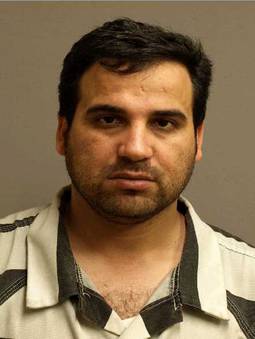Fiscal-Cliff Focus Moves to House
WASHINGTON—The fiscal-cliff deal is now in the hands of the House, which convenes New Year's Day to consider a budget agreement that would boost income-tax rates for the first time in 20 years—but only for those with the highest incomes—maintain unemployment benefits, and limit the spending cuts that were looming as part of the cliff.
The Senate cleared the package 89-8 more than two hours into the New Year on Tuesday after President Barack Obama and Senate leaders finalized its contents.
The House convenes at noon Tuesday and its next steps are uncertain. Supporters of the compromise hope the big bipartisan vote of approval in the Senate would help propel the measure through the House and onto Mr. Obama's desk for his signature by Thursday.
Conservative Republicans, however, are dismayed the compromise raises tax rates and doesn't include more cuts in federal spending. House Speaker John Boehner (R., Ohio) has raised the possibility the House could amend the bill and send it back to the Senate.
House Republican leaders have made no decisions about how quickly to act, not wanting to get out ahead of their rank-and-file lawmakers, who want time to review the deal. Democrats are expected to deliver enough votes to help secure passage, assuming Mr. Boehner takes up the same package that cleared the Senate.
The delay in approval meant that the U.S. technically went over the fiscal cliff at midnight, but with U.S. markets closed Tuesday, the impact of missing the deadline could be minimal. What damage the wrangling has caused—to the 2013 tax-filing season and consumer confidence—is already assured.
The compromise was prepared for the Senate floor after Vice President Joe Biden, who brokered the deal with Senate Minority Leader Mitch McConnell (R., Ky.) traveled to the Capitol for a New Year's Eve meeting with Senate Democrats, including many who harbored reservations about the deal.
"This shouldn't be the model for how to do things around here," Mr. McConnell said on the Senate floor shortly before the vote. "But I think we can say we've done some good for the country. We've taken care of the revenue side of this debate."
One of the most strident opponents to the bill was Democratic Sen. Tom Harkin of Iowa. Speaking on the Senate floor shortly before the vote occurred, he railed against the compromise saying it benefited the wealthiest Americans at the expense of those who could afford it least.
"Maybe now we are all believers of trickle-down economics. Not I," Mr. Harkin said, declaring he would vote against the legislation.
In addition to Mr. Harkin, seven other lawmakers voted against the bill. They were: Democratic Sens. Tom Carper of Delaware and Michael Bennet of Colorado and Republican Sens. Charles Grassley of Iowa, Mike Lee of Utah, Rand Paul of Kentucky, Marco Rubio of Florida and Richard Shelby of Alabama.
Major elements of the compromise would:
Permanently raise tax rates to 39.6% on income over $400,000 for individuals and $450,000 for jointly filing couples.
Raise taxes on capital gains and dividends for those households, from the current 15% to Clinton-era levels of roughly 20%.
Limit the value of personal exemptions as well as the value of itemized deductions, two restrictions that would kick in at $250,000 for individuals and $300,000 for married couples filing jointly. Those limits disappeared in 2010.
Set the estate tax rate at 40% on estates over $5 million, up from the 35% that applies now to those over $5.12 million. That isn't as high as the 45% rate Mr. Obama sought with a $3.5 million exemption.
Delay for two months part of the $110 billion in spending cuts that otherwise would have taken place in early January—cuts that would be replaced by tax increases and cuts in other programs.
It continues an existing pay freeze for members of Congress for the current fiscal year, but doesn't extend the pay freeze for federal government workers.
The bill also included a measure preventing a sharp increase in the price of milk that was feared early in the new year, and extending some other agricultural programs through September. The last five-year farm bill expired at the end of last September as lawmakers were unable to reach a deal on the sweeping legislation.
Left out of the bill were any disaster-relief funds to help assist the recovery effort from the devastation caused by Superstorm Sandy across the Eastern U.S. in October. The Senate passed a bill last week providing $60 billion in emergency relief, but the House has yet to act to bring forward similar legislation.
The wider deal doesn't do much to control the U.S.'s long-term budget woes, which are driven largely by entitlement spending, especially on health care, left untouched in this agreement. And depending on the budget math and the ultimate fate of the spending cuts, it may not do much for the short-run deficit either.
By waiting until the last minute, and by cutting a deal on a much smaller scale than either side once envisioned, Washington also deferred many of its thorniest questions, though perhaps for only a few weeks. In late February of early March, the Treasury Department will run out of extraordinary measures to deal with the government's borrowing limit—which it otherwise would have reached on Monday—and Congress would need to approve an increase.
The delay in the spending cuts will run out about the same time. In effect, Congress has delayed the fiscal cliff by erecting a new and potentially more dangerous one.
Mr. Biden, asked about the outlook for the compromise, told reporters that his long experience on the Hill taught him two things. "You shouldn't predict how the Senate is going to vote before they vote—you won't make a lot of money," he said. "And you surely shouldn't predict how the House is going to vote. But I feel very, very good."
Asked what pitch he made to liberals who were skeptical of the deal, Mr. Biden said he told them, "This is Joe Biden and I'm your buddy."
The changes in tax rates that were agreed to between Messrs. Biden and McConnell would raise roughly $600 billion in new revenue over 10 years. While that would represent the largest tax increase in decades, it would be less than 20% of the revenue that would have come in if policy makers allowed all the current tax breaks to expire on New Year's Eve.
The Biden-McConnell deal is a classic compromise that included something for everyone to love—and hate. The key question is whether the positive components and the pressure of the Jan. 1 deadline are enough to neutralize the parts that raise objections. If not, attacks from the left and right could combine to topple the deal.
For Republicans, the bill includes the bitter medicine of the first income-tax rate increase since 1993, a violation of the anti-tax orthodoxy that has defined their party. On the other hand, it would codify the Bush-era lower income-tax rates for most Americans as permanent law, ending the recurring battles over how long they will endure.
For Democrats, the bill's tax increase makes good on their party's marquee promise in the 2012 election to raise taxes on upper-income Americans and not the middle class. But many Democrats, especially liberals, were infuriated that the bill set the income threshold as high as $450,000.
Heading into a meeting with Mr. Biden and Senate Democrats, Sen. Clare McCaskill of Missouri said, "Nobody's happy—that means it's probably a compromise."
But Sen. Barbara Boxer (D., Calif.) said that Mr. Biden at the meeting told Democrats that the compromise advanced Democratic Party principles. "He told us we can stand proud and tall that a lot of our values were protected," said Ms. Boxer.
"There are many, many reasons people don't like the proposal but there is very close to unanimity that it's better than going over the cliff," Sen. Charles Schumer (D., N.Y.) said after the meeting. "There are disagreements on this provision, that provision and other provisions are large and wide but the number of people who believe we should go over the cliff rather than vote for this is very small."
One sticking point in the talks had been automatic spending cuts, known as the sequester, set to take effect in coming days.
Republicans had insisted the cuts of $24 billion be offset with savings in other areas. The White House wanted some of the offset to be in the form of tax increases, not just other spending cuts.
The deal pays for delaying the sequester with a mix of new taxes and spending cuts, according to several congressional aides.
Of that $24 billion cost, $12 billion would come from a shift in the rules affecting workplace-based 401(k) plans. The change would allow plan holders to roll their 401(k) assets into a Roth IRA plan, which would require them to pay taxes up front on any gains in their plan. The benefit for investors would be that disbursements from Roth plans in retirement are tax free.
In effect, the move provides more up-front revenue to the Treasury, but potentially at the cost of revenue over the long term—as taxes paid when individuals make withdrawals from their 401(k) plans would likely be far greater.
Other elements of the deal could be costly. It calls for a permanent fix to the alternative minimum tax, a one-year extension of unemployment insurance benefits, and a five-year extension of other tax breaks. Among them are tax credits for families of modest means, including one for college tuition, and an expanded earned income tax credit, which provides cash to working poor families who don't earn enough to pay income taxes. It also would block a scheduled cut in Medicare payments to doctors for one year.
The deal taking shape also would include tax breaks adopted by the Senate Finance Committee earlier this year, aides with knowledge of the talks said. Among them was a one-year extension of the tax credit, with slight modifications that would allow wind-farm developers to claim the credit for projects that begin construction by Jan. 1, 2014.
Some Democrats and liberal activists said they believe the White House gave up too much, weakening Democrats' position heading into next round of budget talks with Republicans. "It's not a good deal if it gives more tax cuts to 2% and sets the stage for more hostage taking," Richard Trumka, president of the AFL-CIO, said in a Twitter message.
Opposition to the deal also came quickly from conservatives. Heritage Action, a conservative political group, urged senators to vote against the bill and said it would be a "key vote" in its ratings of lawmakers.
"This kick-the-can approach, necessitated by a president who refuses to stop campaigning and start seriously addressing our nation's fiscal problems, is not an adequate solution to America's coming fiscal crisis, which is a result of overspending, not under-taxing," the group said in a written statement.
Labels: CONgress, Political economics, POTUS Barack Obama






































